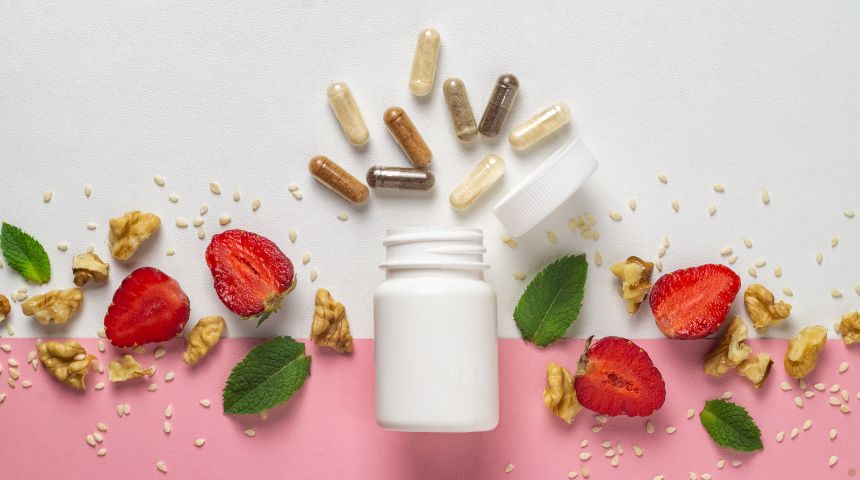From Blurry to Bright
If you’re experiencing blurry vision it can be a sign that you need new glasses or there’s a medical condition at play. Common conditions include macular degeneration, diabetes, pre-eclampsia or a migraine. Your eyes are complex organs, so if your vision blurs, it’s best to seek advice and support from a medical professional.
But in the meantime, are there ways you can keep your eyes healthy? Luckily, yes. There are plenty of vitamins and minerals that contribute to eye health, keeping your eyes and vision at their best. And if you aren’t currently experiencing any eye issues, taking these vitamins can ensure your eye health continues.
Let’s take a look at some of the best vitamin supplements and nutrients for blurry vision.
8 of the Best Eye Vitamins for Blurry Vision
1. Vitamin A
Vitamin A plays a crucial role in eye health. Part of this vitamin’s job is to maintain a clear cornea (the layer that covers and protects your eye). It also helps produce the protein in your eye that helps you see better even in low lighting.
While a vitamin A deficiency is rare, it’s still important to keep up your intake of this vital vitamin. To do so, eat plenty of bell peppers, leafy greens and sweet potatoes.
2. Vitamin C
Vitamin C is a powerful antioxidant that keeps your eyes healthy and helps prevent eye conditions and illness. Found in citrus fruits, broccoli, kale and bell peppers, vitamin C can even reduce the risk of developing cataracts.
It also plays a crucial part in collagen, which helps ensure all parts of the eye are working as they should be.
3. Vitamin E
Vitamin E, like vitamin C, is a powerful antioxidant. It helps prevent the effects of oxidative stress on the body. This includes the cells that make up your eyes. Luckily, it’s easy to get plenty of vitamin E in your diet simply by eating foods like avocado, salmon and leafy greens.
4. B Vitamins
B vitamins, including B12, B6 and B9 (also known as folate), are a must for optimal eye health. One study found that consuming B vitamins can significantly reduce the risk of developing age-related macular degeneration. It’s safe to bet that getting plenty of B vitamins helps protect the eyes as you age.
Foods rich in B vitamins include nutritional yeast, lean meats and fortified cereals, but B12 in particular can be hard for vegans to get enough of from food alone, so supplements are recommended.
B vitamins are also great for energy, so you might find after taking them for eye health you feel more refreshed and energized, too.
5. Zinc
Zinc is a mineral that can be incredibly useful in the pursuit of healthy eyes. It supports antioxidants that contribute to eye health by preventing oxidative stress. While zinc supplements can ensure you get enough zinc for your eye health, the mineral is also found in foods including red meat, whole grains and oysters.
6. Omega-3 Fatty Acids
Commonly found in oily fish, omega-3 fatty acids help form the cells of your eye, making them an optimal part of eye health. As well as helping form crucial components of the eye, omega-3 fatty acids help dry eyes produce more tears.
To increase the amount of omega-3 fatty acids in your diet, reach for foods like oily fish, soy, nuts, chia seeds and flaxseed.
7. Riboflavin
Also known as vitamin B2, riboflavin can positively contribute to eye health in multiple ways, including preventing oxidative stress and potentially reducing the risk of cataracts. Include more riboflavin in your diet by taking supplements or eating oats, milk and fortified cereal.
8. Vitamin D
While you might already know how great vitamin D is for bone health, you’ve likely not heard how effective it can be for your eyes, too. Some studies suggest it can reduce the risk of macular degeneration.
You can get vitamin D from the sun (although always use SPF and avoid long sun exposure) as well as meat, fatty fish and fortified dairy products. If you live in an area that doesn’t get much sunlight, consider taking vitamin D supplements year-round.
While you can easily ensure you get enough of the best eye vitamins for blurry vision through supplements, it’s worth researching foods to incorporate naturally into your diet, too. You can even opt for IV therapy to get more important nutrients in one quick, convenient way.

